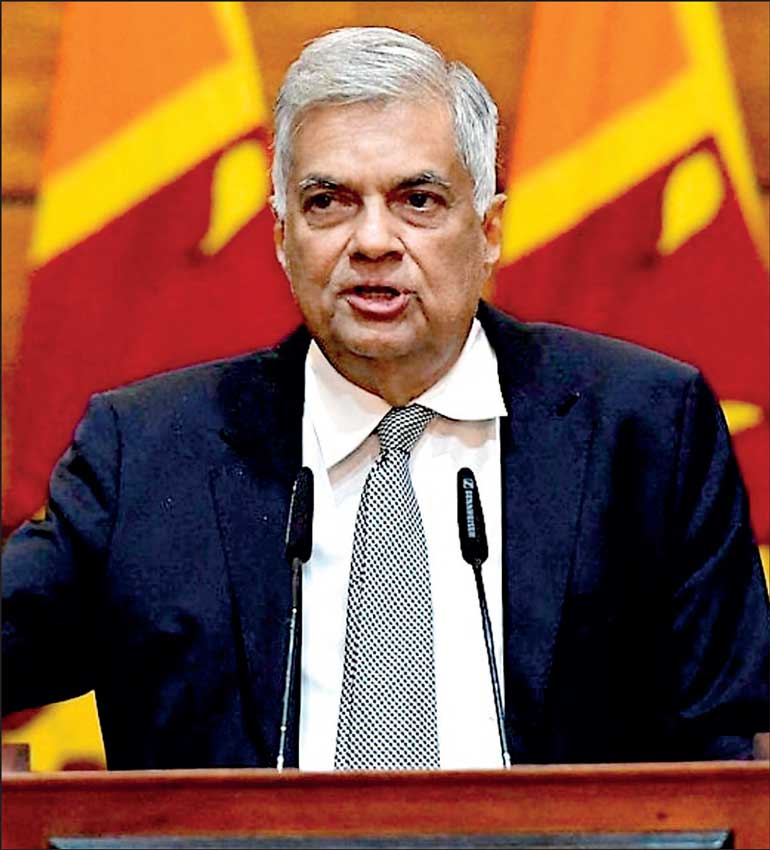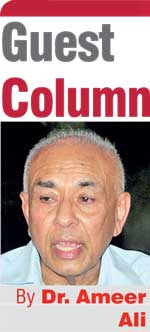Wednesday Feb 18, 2026
Wednesday Feb 18, 2026
Thursday, 18 August 2022 00:07 - - {{hitsCtrl.values.hits}}

President Ranil Wickremesinghe
 President Ranil Wickremesinghe (RW) without mandate from the people, but elected from the floor of the legislature, naturally wants to strengthen his position by widening his support base inside the Parliament. His initial plan to form an all-party government proved difficult. He has now turned his attention to form an omnibus cabinet to accommodate into it as many as possible tempting them with ministerial positions.
President Ranil Wickremesinghe (RW) without mandate from the people, but elected from the floor of the legislature, naturally wants to strengthen his position by widening his support base inside the Parliament. His initial plan to form an all-party government proved difficult. He has now turned his attention to form an omnibus cabinet to accommodate into it as many as possible tempting them with ministerial positions.
He knows from past experience how his colleagues could be swayed to change side at the right price and at the right time. Already minority ethnic parties like SLMC and DPA are bending backwards to credit RW for establishing some semblance of normalcy in the country. Ranil’s cabinet is therefore a trap to win support and silence the critiques before the full agenda for economic revival is revealed after completion of talks with IMF.
Evidence of shortening queues by introducing better methods of distribution of cooking gas and fuel, and at slightly reduced prices are pleasant surprises which would help calm down the angry nerves of the masses. But how long would these surprises last depend on how soon RW could manage to get emergency funding from international sources to pay for more imports. Prematurely though, certain quarters of the opinion industry have already issued complementary testimonials to boost RW’s presidential credibility and image.
In reality, judgement on RW’s performance should wait until the full gamut of IMF initiated reforms are released and presented to the Parliament with a detailed mechanism to implement them. They are certainly not going to make life easier to a vast majority of people. This is why RW wants the entire Parliament to accept the reforms unanimously and share the resulting praise or blame with him. An enlarged cabinet with ministers from diverse political affiliations would therefore help him to confront criticisms with a steady hand.
Having warned the nation already of incoming hardships, which according to RW would last optimistically for six months, but realistically for more than a year ceteris paribus, he is preparing himself to take a tough stand against would be dissenters and protestors. Emergency regulations had already been passed permitting the use of force if necessary to control any riotous street demonstrations. What he did to Aragalaya soon after he became President was only a prelude for things to come. His prelection to praise the military after visiting the Army Head Quarters on 9 August, also reveals his readiness to call upon the military to enforce law and order if reactions to reforms turn ugly and violent.
The secret behind an omnibus cabinet is therefore to recruit a team of yes men and women to defend RW’s agenda which, according to him, would “reset the economy” and transform the country from its current failed state status into a “First World Nation by 2048” – a grandiose dream from a grandstanding president.
RW’s route to achieve that transformation is by creating a robust export economy with “innovative thinking” while being cognisant of global changes, use of renewable and nuclear energy, and by maintaining “sustainable foreign loans”. These are obviously reforms of a tall order and reflect the need of the time; but the question is whether such reforms could ever be successfully implemented and yield the desired outcome when the socio-political system on which such an economy is set to operate remain undemocratic, corrupt and ethno-chauvinistic? It is this basic foundation that the Aragalaya youth called the “system” and demands that be changed. RW has astutely twisted that call and confused systemic change with change in the economic model.
RW is intelligent, educated, experienced and like his mentor J.R. Jayewardene, politically shrewd, in comparison to many of his current parliamentary colleagues. He understands clearly the real meaning of Aragalaya’s demand for systemic change. He is also aware that the demand for systemic change vibrates in international circles in their reaction to what had happened to Sri Lankan society and its economy under the previous regime.
UN agencies, diaspora communities and even friendly countries had been critical of the sectarian character of Sri Lanka’s political governance, its development path and social infrastructure. Without changing that system and democratise governance on a secular foundation no economic model could successfully operate to pull this country out of its current morass. This is why RW’s very long-term dream of transforming the country to First World status through dynamic economic modelling would fail.
In fact, the dire situation into which this country has been pushed into today, is the product of a rotten political system managed by corrupt and chauvinistic leaders. RW is aware of this but he is unable to get rid of it without a mandate from the people.
Aragalaya has vacated Galle Face Green, as it promised to do even before RW sent his armed force to clear that precinct. But it has not closed and will not close its mission. “We did not do this for months … for fun, our anger was against Sri Lanka’s corrupt political culture, (and) that anger has not changed, it is still alive, we will learn from our mistakes and rise again”. These words, quoted by a journalist, are from one of the female Aragalayers and they send a clear message to RW.
So far, he has employed the government security machinery to hunt down, arrest and incarcerate suspected Aragalayers for alleged criminal behaviour. The fact that he suspects them for setting fire to his private residence adds a personal grudge against his anti-Aragalaya stand. However, he had remained totally indifferent or nonchalant to chase after the mega-culprits who made this country bankrupt by enriching themselves, their families and friends. He will not go after them, because he owes his Presidency to the same gang and it is with their support that he could remain so at least until 2024, if not beyond. But where is his gratitude to Aragalaya that made all this possible?
The only party that has so far refused to be enticed by RW’s ministerial offers is JVP/NPP. It is a sensible move on its part to escape the president’s cabinet trap. While Aragalaya decentralises its protest and continues with its mission island-wide, it is incumbent upon JVP/NPP parliamentary leadership to echo Aragalaya grievances from inside the Parliament. Aragalaya has not yet developed an independent leadership and there is ample common ground between the youth movement and JVP/NPP to come to an understanding and present a credible political alternative to Sri Lankan voters. Sooner they realise this and act as a coalition better for the economy and country.
(The writer is attached to Murdoch Business School, Murdoch University, Western Australia.)